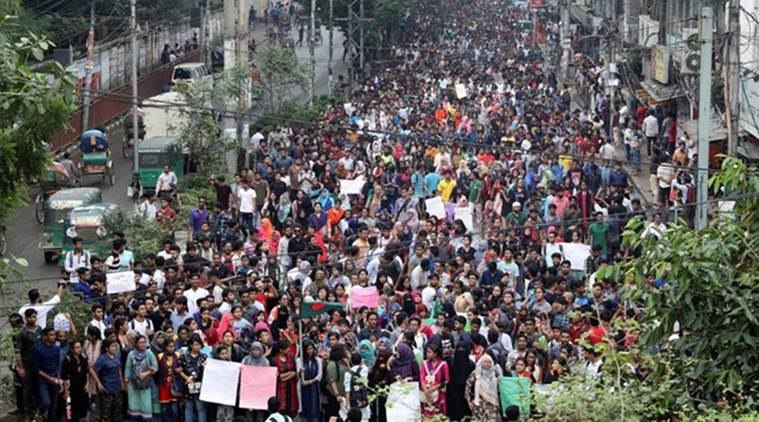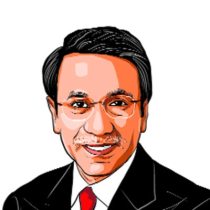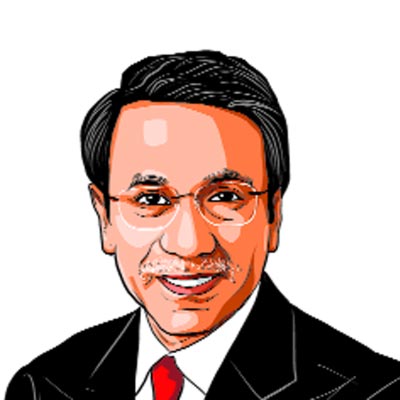Seeking justice in Dhaka
Students’ protests may have dwindled. But ruling Awami League must see they reflected deep discontents

Thousands of students join in a protest over recent traffic accidents that killed a boy and a girl, in Dhaka, Bangladesh, August 5, 2018. (Source: REUTERS)
The unprecedented week-long protests by Bangladeshi teenagers demanding “road safety” have come to an end. Violence, largely perpetrated by members of the law enforcement agencies and activists of the ruling party against the young protestors and journalists, has succeeded in suppressing a peaceful movement. Additionally, the government has arrested internationally acclaimed photographer and human rights activist, Shahidul Alam, ostensibly for his criticism of the government in an interview with Al Jazeera. At least 22 students are now languishing in jail, awaiting trial, and hundreds of young people have been targeted via their social media accounts for their support to the movement alleging that they spread “rumours”. These developments raise the question: What’s next?
Spontaneous protests by college students against the death of two students in a road accident on July 29 in the capital spurred a movement for road safety that brought thousands of teenagers to the streets throughout the country. Despite steps by the government, including promises from the ministers of meeting the demands, closing schools, requesting teachers and guardians to take the children back from the streets and slowing down the internet, the demonstrations swelled. Caught off guard by the disciplined nature of the movement, the resolve of the teenagers, the scale of public support, and the increasing shift of public discourse from “road safety” to broader issues of governance and accountability, the government and the ruling party swiftly veered towards its usual tactics of blaming the Opposition for “infiltrating the movement” and using force. As the slogan of the movement, “We want justice”, took on a life of its own and increasingly brought issues of accountability to the fore, many wondered whether this reflects simmering discontent among younger populations about the direction of the state. The ruling party was palpably uncomfortable in an election year.
Press reports, videos and pictures show that members of the student organisation named Bangladesh Chhatra League (BCL) affiliated with the ruling Bangladesh Awami League (BAL), attacked the protestors and journalists. On July 5, amid protests and clashes between the protestors on the one hand and the police and helmet-wearing purportedly BCL supporters, rumours spread that several students had been killed and four women were raped by anti-demonstration groups. These rumours, which became viral, added fuel to the fire. The government and its supporters alleged that these rumours were deliberately spread by the Opposition Bangladesh Nationalist Party (BNP) and its ally the Jamaat-i-Islami (JI) to destabilise the country and incite students to attack the BAL office located near one of the places where demonstrations were taking place. The BNP and its allies have denied any involvement.
The government’s decision to adopt heavy-handed measures, especially employing law enforcing agencies and BCL activists, were not new. In the past years, particularly since the controversial election of 2014, police and ruling party activists attacked demonstrators, including university teachers, on numerous occasions. The quota reform movement by the youth, ongoing since April, has been meted a similar treatment. Several leaders of this non-partisan youth movement are now in jail facing charges under Section 57 of the draconian Information and Communication Technology Act (ICT).
In the midst of these events, on August 5, hours after giving an interview to Al Jazeera, the award-winning photographer Shahidul Alam was picked up from his home by plain-clothed people who claimed to be members of the Detective Branch (DB) of the police. He was dragged into a car, the CCTV camera at his home was destroyed, and footage confiscated. The next day, visibly unwell, Alam was hauled to the court, barefoot. As he limped to the court he alleged that he was “hurt” in custody and was deprived of his legal rights. He was charged under the infamous Section 57 of the ICT Act which allows the government to accuse anybody of hurting the image of the country. The court rejected the bail plea and he was remanded to police custody. In fact, the arrest of Shahidul Alam and the treatment he received at the hands of the police, was not an isolated incident. Many have faced a similar situation in the past years. It is symptomatic of the governance of the country. The progressive attenuation of democratic spaces and the government’s penchant for silencing the dissenting voice, the decimation of the legitimate Opposition through judicial and extrajudicial measures, muzzling of media and condoning of extra-judicial killings and enforced disappearances, have become the markers of governance in the country.
Ever since the teenagers vacated the streets, the ruling party seems to think it has succeeded in quelling the movement. Instead of a soul-searching about what prompted such an outpouring of support for the movement, the government has gone after the alleged rumour-mongers in full force, while it has not even attempted to identify, let alone take any action against, those who attacked the marchers and journalists in the presence of the police. The ruling party general secretary’s demand for evidence that the BCL members were involved, even as there scores of reports and videos have documented the perpetrators, reveals the extent of impunity enjoyed by ruling party activists.
The way a social movement with no anti-government agenda was dealt with, Shahidul Alam is being treated and the students are harangued, leaves little to the imagination about the nature of the overall political climate.
There are two potential scenarios for the near future. If the behaviour of past years is any indication, the predictable scenario is that the government further tightens its grip, continues to go against anyone it thinks participated in the movement, puts pressure on the media, and arrests Opposition leaders for allegedly inciting violence. It continues to disregard the calls from all around the world for the release of Shahidul Alam, making the incarcerated students and their families suffer to send a loud and clear message that dissent will not be tolerated. In short, perpetuating a culture of fear which has permeated society. This may benefit the ruling party in the short term, but it has a political price-tag for the future: The potential adverse reactions of the youth.
The second, unfortunately unlikely trajectory, is the realisation that recent events are not machinations of the Opposition but reflective of deep-seated discontents, propelling a move away from repressive measures, opening of democratic spaces for disagreement, freedom of speech and peaceful assembly. It is up to the ruling Bangladesh Awami League to decide which path it will take.
The writer is a Distinguished Professor of Political Science at Illinois State University, USA
For all the latest Opinion News, download Indian Express App
More From Ali Riaz
- Another blogger downThe lesson is clear: In Bangladesh, the extant culture of impunity that discriminates between perpetrators of crimes based on their political identity must be ended...
- A culture of fearIn Bangladesh’s diminishing democratic space, it’s not surprising a prominent editor is at the receiving end...








































No hay comentarios:
Publicar un comentario